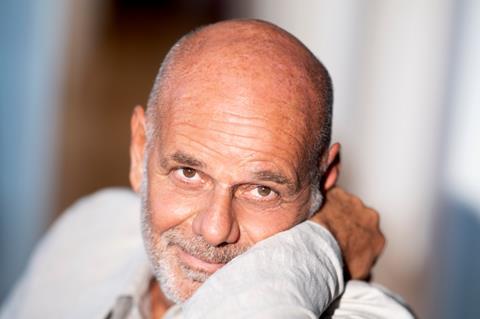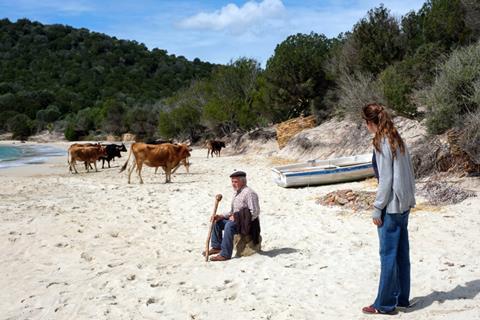
When looking for the star of Rome opening-night film La Vita Va Così, a comedy based on a true story about a Sardinian shepherd who refuses to sell his land to hotel developer, Italian director Riccardo Milani cast a real shepherd and non-actor Giuseppe Ignazio Loi, and set the film in the village when the real events took place.
Milani, whose credits include local hits A World Apart, Thank You Guys and Like A Cat On A Highway, says he wanted to make a film about “ a man who showed the world that not everybody has a price, a kind of fable that works like a little light in the darkness”.
La Vita Va Così also stars renowned Italian actors Virginia Raffaele. Diego Abatantuono and Aldo Baguio.
It is produced by Our Films, part of the Mediawan group, and by Wildside, part of Fremantle Group, in association with Medusa Film and PiperFilm, which will co-distribute it, and in collaboration with Netflix. PiperFilm handles international sales.
Milani talks to Screen about the challenge of earning the trust of the community and his belief that popular cinema has the power to change the world.
The film is inspired by a true story of a shepherd in Sardinia who refused to sell his land to build a tourist resort, protecting one of the most beautiful beaches on the island. When and why did you decide to make a film about this?
I found out about it about 10 years ago. This shepherd died in January 2024 and I wondered about what ending we could give his story in a film. What really drew me to it was the community because it was an event that shook it and divided it between those who supported the project and those who opposed it. It was something that is very much present in our country, the tug of war bewteen two key issues, the need for work and the respect of the territory.
And, yes, there was also the story of a little big man, doing a noble but forgotten job tending his cows and also standing his ground in front of a very powerful company. I felt there was a film to be made about a man who showed the world that not everybody has a price, a kind of fable that works like a little light in the darkness.

How did you put the film together?
I have worked for many years with [producer] Mario Gianini [from Our Films]. He knows of my love for Sardinia and I called him when the shepherd died and told him my wish to tell his story. We understand each other very well with Mario in making films that are fun and popular, but that also talk about issues that affect us all.
We started writing [with Michele Astori] at the beginning of 2024. We travelled to Sardinia several times, partly to help us with the screenplay, partly to start location scouting and to look for [someone to play] our shepherd. Principal photography took place between February and April in 2025, mostly in Sardinia.
What were the biggest challenges while filming? What surprised you the most?
I was impressed with the ease with which Giuseppe Ignazio Loi, our shepherd, got used to filming. He had absolutely no previous experience of it. He is proud of his job, he’s serene and surprised everybody. Shepherds are not exactly used to being surrounded by people, they spend alot time alone.
What also surprised me was the reaction of the people of the area when they found out we were making a film. They distanced themselves at first. They had never seen such a big crew and also we were dealing with real-life events that had affected them all one way or another. Thankfully, things started to shift in the first days of shooting. A lot of local people were involved in the production and they could experience the production first-hand. They understood the project and how we were tackling it. When we finished we were all, them and us, equally sad. That moved me.
Do you think comedy is one of the best genres with which to comment on society?
Not necessarily, but I do believe in cinema as a space open to all sorts of reflections. And to do it in a popular manner is important to me. I always think I need to reach out to the people that think differently to me. Cinema is like a talk show, but noble and less violent. Comedy gives me the chance for me to say what I think.
Actress and filmmaker Paola Cortellesi, also your wife, had a huge box-office hit with There’s Still Tomorrow. Is that a hopeful sign for the Italian film industry? Do you see others?
There is an extremely interesting new generation of actors and filmmakers. Paula made the effort to reach the audience. It’s important to have the audience in mind. I have always thought of the audience too as a filmmaker.
How much do you discuss the filmmaking process at home together?
Not at all. Zero. We share our view on cinema, a sensibility towards the topics we deal with but we never discuss our projects. We did, of course, in the films we made together when I directed and she was working as an actress, but not now when we are both directing. I don’t know why, but that’s the way it is!















![[L-R]: Amanda Villavieja, Laia Casanovas, Yasmina Praderas](https://d1nslcd7m2225b.cloudfront.net/Pictures/274x183/6/4/1/1471641_pxl_20251224_103354743_618426_crop.jpg)









No comments yet